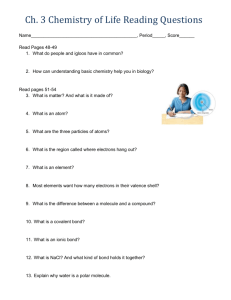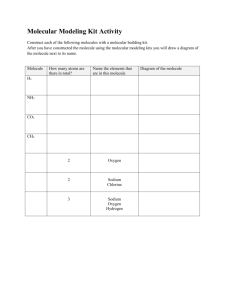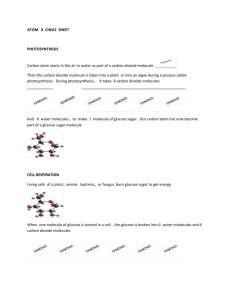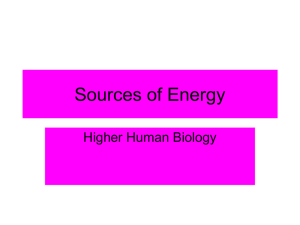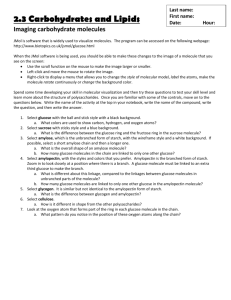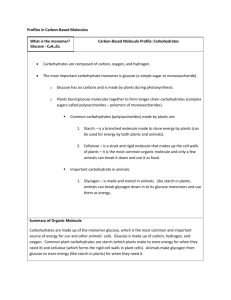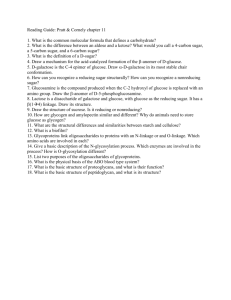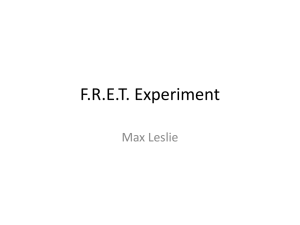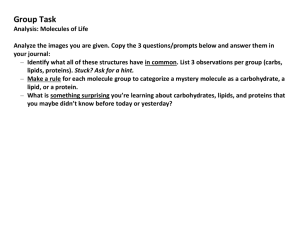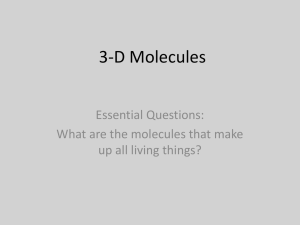Test2 ch3-4
advertisement
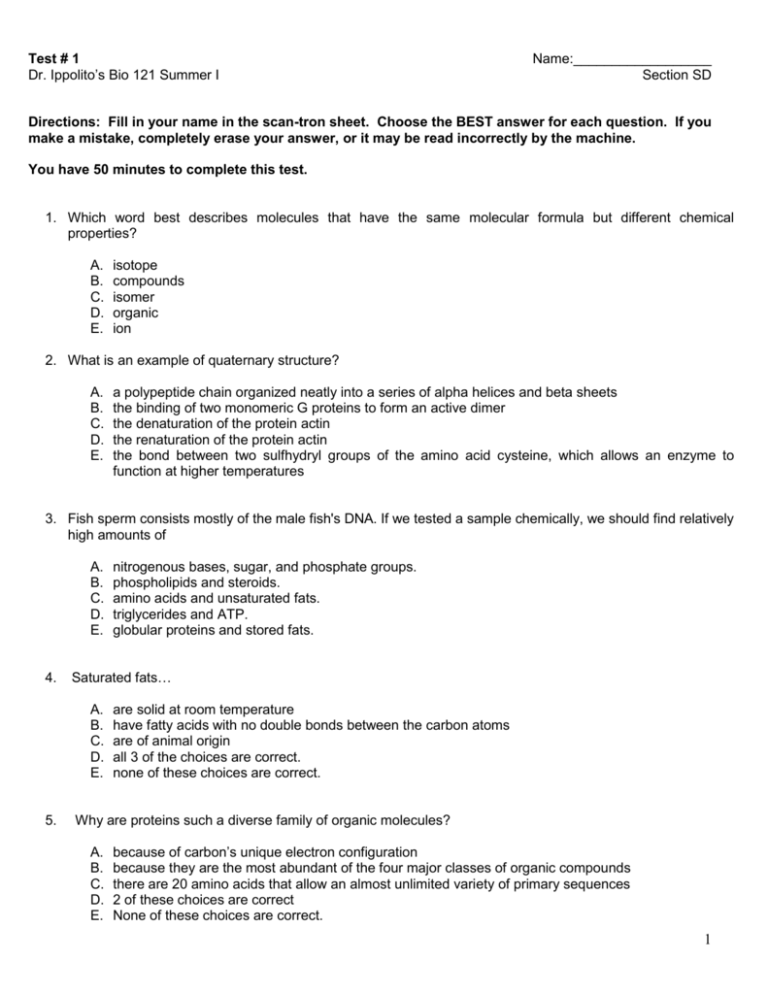
Test # 1 Dr. Ippolito’s Bio 121 Summer I Name:__________________ Section SD Directions: Fill in your name in the scan-tron sheet. Choose the BEST answer for each question. If you make a mistake, completely erase your answer, or it may be read incorrectly by the machine. You have 50 minutes to complete this test. 1. Which word best describes molecules that have the same molecular formula but different chemical properties? A. B. C. D. E. isotope compounds isomer organic ion 2. What is an example of quaternary structure? A. B. C. D. E. a polypeptide chain organized neatly into a series of alpha helices and beta sheets the binding of two monomeric G proteins to form an active dimer the denaturation of the protein actin the renaturation of the protein actin the bond between two sulfhydryl groups of the amino acid cysteine, which allows an enzyme to function at higher temperatures 3. Fish sperm consists mostly of the male fish's DNA. If we tested a sample chemically, we should find relatively high amounts of A. B. C. D. E. 4. Saturated fats… A. B. C. D. E. 5. nitrogenous bases, sugar, and phosphate groups. phospholipids and steroids. amino acids and unsaturated fats. triglycerides and ATP. globular proteins and stored fats. are solid at room temperature have fatty acids with no double bonds between the carbon atoms are of animal origin all 3 of the choices are correct. none of these choices are correct. Why are proteins such a diverse family of organic molecules? A. B. C. D. E. because of carbon’s unique electron configuration because they are the most abundant of the four major classes of organic compounds there are 20 amino acids that allow an almost unlimited variety of primary sequences 2 of these choices are correct None of these choices are correct. 1 6. An organic molecule is isolated from rat tissue. The molecule dissolves easily in water, and experimentation shows it also has the ability to break bonds between sugar molecules. If it is heated, and then cooled again, the molecule can still break bonds between sugars, but less effectively. Which of the following statement(s) is/are true? A. B. C. D. E. The molecule is most likely a polypeptide The molecule partially renatures after denaturation The molecule is probably a hydrocarbon with various hydrophobic functional groups associated with it The molecule is most likely a lipid A and B 7. The lipids of the cell membrane and the lipids found in butter and vegetable oil differ in which of the following? A. B. C. D. E. the number of fatty acids attached to the glycerol molecule the glycerol molecule the carbon to carbon bonds lipids of the cell membrane do not have hydrophobic sections of the molecule the phosphate found in butter and vegetables make these lipids polar 8. How are oils and steroids different? A. B. C. D. E. Oils are hydrophobic and steroids are hydrophilic Steroids have a rigid carbon backbone; oils do not. Steroids have a polar head group and a nonpolar tail; oils do not. B and C A and C 9. Glucose can exist as both an open-chain form and a closed-ring form. Before 1900, glucose was only thought to occur as an open chain. Now we know that over 99 percent of the time, glucose occurs in the closed-ring form. What possible difference between these forms would give chemists a clue that the openchain form was not present? A. Open-chain molecules can form polymers and glucose does not B. Only open-chain forms can undergo condensation, which does not occur with glucose C. An open chain presents ends with functional groups (in this case aldehyde), and glucose failed to undergo typical aldehyde reactions; a phenomenon that could be explained by having no end functional group in a ring structure D. Because glucose is solid at room temperature, it must have saturated hydrocarbon chains E. Glucose could not be "denatured" so it must be a tight chain 10. A dehydration reaction is a _________ reaction because it forms water. A. B. C. D. E. a hydrolysis a synthesis an energy-releasing a condensation monomer formation 11. What is the best example of quaternary structure? A. a polypeptide chain organized neatly into a series of alpha helices and beta sheets B. the binding of two monomeric proteins to form an active dimer 2 C. the denaturation of a protein D. the renaturation of the protein E. the bond between two sulfhydryl groups of the amino acid cysteine, which allows an enzyme to function at higher temperatures 12. A protein inside the cell does not fold correctly. Which of these hypotheses supports this observation? A. B. C. D. E. A critical chaperone protein may be mutated. The cell (and therefore protein) is in an environment that is too cold. The cell (and therefore protein) is in an environment that is too hot. B and C A and C 13. If an animal needed to store energy for long-term use, but not be encumbered with the weight of extra tissue, which is the best molecule for storage? A. B. C. D. E. fructose and glucose in the form of honey fat molecules in the form of triglycerides glucose and galactose in the form of highly branched chains called amylopectin starch glycogen with extensive side branches of glucose 14. The reactivity of an organic molecule is primarily dependent upon ____________of the molecule. A. B. C. D. E. the carbon skeleton the attached functional groups such as an hydroxyl group the isomer the ability to solubilize in water all of the choices are correct Identify the most correct answers for the below fill in the blanks. Answers can be used more than once or not at all. 15. __ contains a peptide bond 16. __ is used as a source of long-term energy storage 17. __ used a source of short-term energy storage 18. __ contains both a carboxyl and carbonyl functional group 19. __ a type of steroid 20. Which of these statements is NOT true about DNA? A. B. C. D. E. It is the genetic material of the cell It forms a double helix Adenine pairs with guanine and thymine pairs with cytosine It contains the pentose sugar deoxyribose The bonds within the sugar of DNA are much stronger than the bonds within the sugar of RNA 3 21. Which of the following lipids forms a bilayer between two watery regions, such as in the plasma membrane of a cell? A. B. C. D. E. steroids neutral fats waxes phospholipids oils 22. Which demonstrates a function for carbohydrates? A. B. C. D. E. The transfer of information from one part of a plant to another The rigid appearance of a leaf The beading of water on a leaf The movement of water from roots to stems A and D 23. Which statement is true about RNA? A. B. C. D. E. It contains adenine paired to thymine. One of the bases from DNA is replaced by uracil. It contains the sugar deoxyribose. Its nucleotides contain twice as many phosphate groups as DNA's nucleotides. It is a double-stranded molecule. When you are finished with your test, please raise your hand and it will be collected. 4
